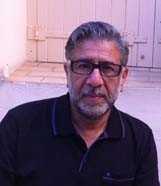Receive Our Newsletter
For news of readings, events and new titles.

THE PHASES OF THE MOON IN LONDON
She and I were talking about the weather, the rusty key that opens conversations here in London. Mrs Morrison, our old neighbour, is the last English woman on our street, where the English have dropped off one by one once the population balance tipped toward the Asian immigrants. She said: “The London sky was not like this in the past, but must have resembled your sky in India.”
I said: “I am from Jordan,” but she did not stop at my correction, which she may not have seen as a correction in the first place. She continued, in the English manner where emotional resonances are difficult to discern, that they too used to see the stars and detect the phases of the moon
I was not convinced, but I played on in this game of English politeness, so I said: “What caused the stars and moon to disappear and the sky to turn, even on those nights clear as a rooster’s eye, into a blotted-out sheet?”
“I don’t know,” she said. “Maybe the change in the weather, or our insatiable consumption of electricity, this excessive urbanization. We light the earth and the sky disappears. You’re probably in better shape in this regard in India.”
“In Jordan,” I said.
Again, she did not pause at my correction. She smiled and began to steer the trolley she used for her daily shopping toward her house announcing the end of a conversation that politeness had imposed on two neighbours who otherwise try all they can to avoid each other when they meet at the door.
I wanted to tell her that the skies of eastern cities, bent under military rule and corruption, are also blotted out, and that the stars that freckled our childhood with comets have also disappeared, but I feared to lose the only gift for which she envied me.
A RESEMBLANCE
I was slurping a mug of cold beer on a hot summer day
when I kept hearing someone loudly puffing at his cigarette and striking his hand on the table every now and then. He was telling his friend that the women he clung to, in his tiresome search for love, were the ones who refused him or let him go.
The first was the neighbors’ girl who rejected him despite his willingness to slit his arteries for her. She opted for a young, muscle-bound baker who had a fierce mane on his head. He never forgot her though he saw her several times walking with slumped shoulders dragging behind her an army of children who leapt around her like ducklings.
(They must be the progeny of that cursed baker.)
As for the second one, she left a bitter taste in him,
a taste that was never shaken from his throat,
after such sweet kisses which he now suspects could never have happened.
How could she have refused him before cockcrow while the spittle of her desired mouth still wetted his lips?
The tone of his last words struck a bell within my depths. My ears turned and widened like radar dishes.
She was a flight attendant working for a foreign airline.
He had met her in this very bar and with him was another friend, a player who was more wily than him. He wished he had never introduced him to her and that he was not with him on that day now engraved on the plates of eternity.
I stopped caring for the story when I predicted its end.
But the voice is what sculpted me, like a two-headed statue, into my seat.
It was the same voice,
the same timbre dripping with sorrow,
the same fist that banged fiercely on the table,
the same story that still leaves a bitter taste in the throat.
I feared to turn around and see myself.
Just two out of eight newly translated poems featured in Banipal 30
All translated by Khaled Mattawa from the author’s collection
Hayatun Kasardin Mutaqataa [Life like a Broken Narrative], Riadh el-Rayyes, Beirut, 2004
These poems and many more are published in Shepherd of Solitude, Selected Poems, by Amjad Nasser, translated by Khaled Mattawa. Click on the link for more information and to buy a copy in the UK.
To buy a copy of Shepherd of Solitude in the US, click here